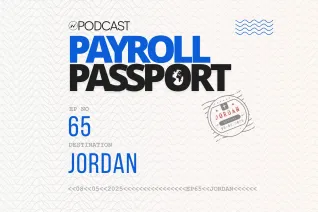Country Spotlight: Payroll in Brazil

Brazil is a remarkable testament to human diversity, housing a populace as intricate and multifaceted as the ecosystems that flourish across its terrain.
Brazil offers an exceptional gateway for global enterprises seeking to broaden their talent pool amidst a tapestry of backgrounds. With its diversified demographics and a workforce reflective of its multicultural essence, it beckons as a prime destination for global expansion. In a world increasingly valuing inclusivity and representation, exploring Brazil's reservoir of skilled professionals from various ethnic origins is a strategic move.
In addition to its enticing prospects, Brazil presents a host of complexities that render payroll processing a delicate task. With its unique regulatory landscape, managing payroll in Brazil demands a service provider well-versed in navigating these intricacies. Let's delve into the challenges that contribute to this intricacy when doing business in Brazil.
YOU MAY ALSO LIKE I Consolidating Global Payroll in Shared Services: Spotlight on Integrating the Long-Tail
Navigating the Tax Labyrinth: Payroll Taxes in Brazil
Brazil possesses a complicated tax and social security system, with multiple layers of taxes at the federal and state levels, and each of these taxes has its own separate rules, regulations, and rates, making it difficult for companies to navigate and keep up with them. Tax rates also vary based on industry, location, and product.
The payroll tax or income tax for employees in Brazil is known as Brazilian Internal Revenue Service (IRS). The IRS rates range from 7.5% to 27.5%, with those earning below BRL 1903.98 having to pay no income tax. Non-residents are taxed a flat 25% tax on all their Brazilian-sourced income only. Other than your taxes on wages, allowances, etc., which are generally taken care of by your employer in Brazil, there are other aspects that are taken into account while calculating income tax in Brazil, such as social security contributions, private pension plans, educational and medical expenses, etc. Brazilian labor laws also permit employees in Brazil to apply a standard deduction rate of 20% on their annual income rather than deduct each specific deduction individually. The total yearly standard deduction is limited to below BRL 16,754.
Embracing Benefits and Leave Policies: An Employee-centric approach
Apart from the deduction, employees in Brazil are provided with obligatory benefits such as
- Thirty days of annual leave after the employee has completed one year of employment at the company, paid at regular wages.
- A holiday bonus equivalent to one-third of the employee's monthly earnings.
- Employees in Brazil are entitled to 120 days of maternity leave paid by social security through the employer with the possibility of a 60-day extension.
- Fathers are entitled to five days of paid paternity leave with the possibility of a 15-day extension.
- Employees are provided with 15 days of paid sick leave by the employer paid for by Social Security.
- Employees are entitled to five days of paid leave for the bereavement of a family member.
- Employees are entitled to up to three consecutive days of paid leave after marriage.
YOU MAY ALSO LIKE I Brazil: A Guideline to Payroll and Employer of Record
Ensuring Financial Fairness: Payroll Standards in Brazil
The minimum wage an employer must pay in Brazil stands at BRL 1320 per month as of July 2023. The payroll cycle followed in Brazil is either bi-weekly (paid every 15 days) or monthly (paid every 30 days). A mandatory 13th-month salary is paid to employees in Brazil at the end of every year. Employees who have worked for a full 12 months are entitled to receive the full payment, while those who have worked for a part of the year will be given a proportional salary. This 13th-month payment happens in two installments, the first in November and the second in December.
The Time Equation
Working Hours
The Ministry of Labor set the standard working hours in Brazil as 44 hours per week. The maximum hours worked per day or week differs based on the employment contract.
Calculating Overtime
Any employee who works over the standard 44 hours per week is entitled to overtime. Generally, overtime is limited to two hours per day and is paid at 150% of the employee's salary rate. Overtime specifications vary based on the employee and can be a potential hassle for the employer; using an efficient time-capturing system would aid you in accurately calculating overtime.
ALSO READ I What is Employer of Record?
Beyond Employment: Employee Contingencies and Severance in Brazil
- For instances where employees are terminated without cause, the employee is entitled to severance pay amounting to 40% of the remainder in the employee's Unemployment Guarantee Fund or FGTS accumulated during the employment period.
- If the employee is terminated 30 days prior to the end of his collective bargaining agreement (a written legal contract between the employer and a labor union representing the employees), the employee is entitled to a payout of accrued vacation, one-third of their vacation bonus, pro-rated 13 months pay and other specifications of the collective bargaining agreement.
In Brazil, workers benefit from labor unions and regulations outlined in the Collective Bargaining Agreement, which safeguard their rights. Employers must adhere to these provisions while simultaneously adhering to the country's labor, tax, and compliance rules. Employers looking to enhance efficiency while mitigating compliance risks need not look any further than Neeyamo's Global Payroll solution.
Neeyamo's Global Payroll Technology Stack offers a comprehensive destination for businesses seeking Brazil's diverse talent. Seamlessly addressing payroll and EOR needs, it presents a powerful tool for global expansion.
Reach out to us at irene.jones@neeyamo.com to take your shot at utilizing the best of what Brazil has to offer. Unleash the transformative power of global growth, guided by Neeyamo's Global Payroll's expertise. Your journey to Brazil's business horizon awaits!
Latest Resources
Stay informed with latest updates
If you're curious and have a thirst for knowledge pertaining to the HR, payroll, and EOR universe, don't miss out on subscribing to our resources.
















